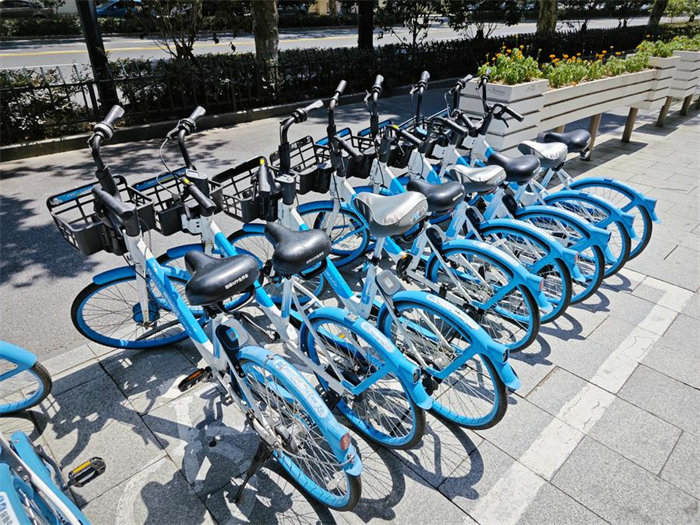
This photo taken on July 22, 2024 shows some of the shared bikes outfitted with "sun-proof coats" among others along a road in Hangzhou, east China's Zhejiang province. (Xinhua/Lin Guangyao)
HANGZHOU, Aug. 8 (Xinhua) -- In the scorching afternoon heat of Hangzhou, where temperatures exceeded 40 degrees Celsius, Mr. Wang stepped out of Wulinmen Subway Station. He skillfully used his mobile phone to scan a code, unlocking a shared bike with a silver seat, and rode it to his destination.
"The original black saddle of the shared bike absorbed too much heat after being exposed to the sun, sitting on it often caused a jolt from the heat. I used to be afraid to ride a shared bike during the summer," Wang said. "The introduction of the silver 'cooling cushion' solved the painful points that troubled riders and greatly improved the summer riding experience."
In Hangzhou, an increasing number of shared bikes are outfitted with "sun-proof coats." These "sun-proof coats" have a silver surface with slight uneven protrusions. In addition, terms such as "anti-hot cushion" and "cool travel" are printed on the backs of the cushions, prompting passengers to pick one to their liking.
According to Hong Lianjie, a staff member of the Hangzhou Comprehensive Administrative Law Enforcement Bureau, the "cool cushion" is made of polymer materials, that can provide physical cooling through sunlight reflection and its own thermal insulation characteristics, enabling "zero energy cooling."
"The surface temperature of the shared bike seat can exceed 60 degrees Celsius after exposure to the sun, posing a risk of low-temperature burns. However, the shared bike equipped with a 'cool cushion' can reduce the surface temperature of the seat by about 20 degrees Celsius, greatly easing the discomfort of the rider," Hong further added.
The installation of "cool cushions" met the riders needs, increased the number of orders for summer riding, and simultaneously cut carbon emissions.
In the summer of 2023, Hangzhou began an attempt to install "cool cushions" for shared bikes. This year's coverage of this work has expanded. Since June, Hangzhou's leading shared bicycle companies have successively installed "cool cushions" for their shared bikes, making it easier for more riders to travel comfortably.
"Last year, less than 10,000 shared bikes in Hangzhou were outfitted with the original 'cool cushion'. The original cushion featured a 'fabric + reflective layer' design, that effectively reduced the temperature of the cushion, but also absorbed water on rainy days, leading to inconvenient riding," said Hong.
This year's new generation of "cool cushions" has been enhanced with waterproof materials and a surface designed to repel water and heat, according to him.
By the end of July, nearly 80,000 shared bikes in Hangzhou have been outfitted with "cool cushions". Around one-third of Hangzhou's shared bikes now have the layer of silver "sun-proof coats".
It is understood that, in addition to Hangzhou, shared bikes outfitted with "cool cushions" have been launched in multiple cities, such as Beijing, Shanghai, Guangzhou, Chengdu, and Xi'an, promoting cool summer travel and creating green, low-carbon, environmentally friendly cities.
